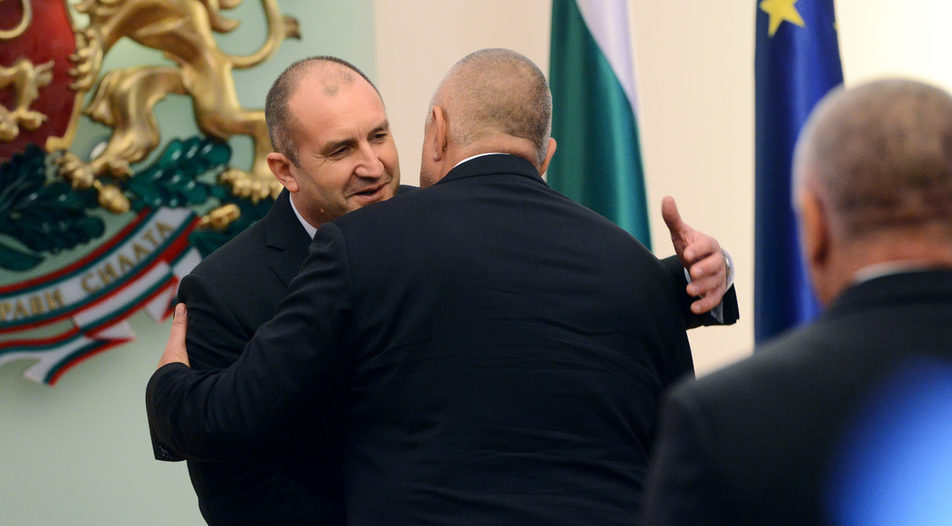Delyan Peevski is not a widely mentioned name, especially when it comes to the Bulgarian political elite and the obliging, government-friendly media. Even though his presence can be felt everywhere - from politics through media outlets to a variety of businesses, few politicians dare to provoke his wrath. Sometimes described as the éminence grise of the Bulgarian politics and economy, Mr Peevski uses the prowess of his media empire to throw dirt on his opponents, remaining invulnerable behind his political shield - the Movement for Rights and Freedoms (MRF) party. The MRF, which draws its support mainly among Bulgarian ethnic Turks and Muslims, is a synonym of cronyism and political corruption, unabashedly supporting legislation serving private interests and accepting in its ranks various oligarchs.
The taboo, however, was briefly broken in mid-February, when first the prime minister and then the president accused each other of having connections with Mr Peevski. The spat sparked a political scandal which died out quickly, well before a potential serious talk on the oligarchization of the Bulgarian politics could begin.
A small mistake or a lie can start a brawl
It all started with a slip of the tongue in a televised interview. Prime Minster Boyko Borissov, knowingly or not, said that the only tension between himself and President Roumen Radev is caused by Ivo Hristov. Mr Hristov, an ex-journalist, is President Radev's chief of staff. What is more, Hristov was called "the grey eminence" in the president's office and the PM specifically mentioned he remembered him "from BBT [] Peevski's TV".
As Mr Hristov himself clarified in a Facebook post, this was not true: he used to be director of the BBT TV channel for just a year between 2003-2004, i.e. before Mr, Peevski bought it. Yet, a shot was fired and on the following day Mr Hristov's boss asked the PM during an impromptu press conference: "If somebody points to links between members of my administration and Mr Peevski, he has to explain: Has he ever had and does he still have meetings with Mr Peevski?; Has he ever had and does he still have shared business interests with him?; Has he ever allocated and does he still allocate public procurements to Mr Peevski?"
"My conscience is absolutely clear", responded on the following day a visibly annoyed Mr Borissov from a press conference on his way to the Munich security forum, adding that if the President had any information about links between him and the self-described 'young and successful' businessman and MRF MP, Radev should bring it to the attention of the Prosecutor's Office immediately.
The president and the prime minister also bickered about who of them was more involved with the MRF. Mr Radev blamed Mr Borissov that he backed the bill tabled by opposition MRF on the assets of bankrupt Corporate Commercial Bank (Corpbank ) that allegedly will stop the plundering of the bank's few remaining assets. Mr Borissov, who never leaves the ball in his court, blamed Mr Radev that he had got elected with MRF votes.
The two are also divided on Turkey. Mr Radev is more hawkish about Ankara and probably a little envious of Mr Borrisov active diplomatic efforts to contribute to rapprochement between Turkey and the EU. The prime minister is also a dove who aims to help mend fences between Bulgaria's southeastern neighbor and the EU, fearing the possibility of Turkey unleashing a refugee crisis on the Bulgarian border.
Enters the pacifier
In the third act of the play, Mr Peevski appeared himself, through a series of statements and a staged interview taken by an unnamed journalist in a media outlet loyal to him. He denied all allegations, blamed Ivo Prokopiev (publisher of KQ and owner of Economedia), Tsvetan Vassilev (Peevski's former business partner and ex-owner of Corpbank) and the 1990s PM Ivan Kostov for the "criminal privatization" and the fake news media environment in the country. The PM and the President were mentioned only in a passing note: "Whatever problems [the two of them] have, I hope they will resolve them like two big boys, generals, without involving an opposition MP".
Mr Peevski's voice of appeasement and reason quickly resonated in the media outlets controlled by him, with experts from all over the political spectrum joining him in his plea for cross-institutional peace.
A few things became clear after these exchanges. First of all, there is a growing tendency of Mr Peevski's name, almost a complete taboo since 2014, to be mentioned more and more openly. In addition to two recent draft bills proposed by him and more occasional open letters to his media outlets, this might signal an attempt to polish his rather unpopular public image.
Last, but not least, the big test whether this is a war of values between the institutions is still to come. If the scandal is quietly and gradually swept under the carpet by the president, this will look either as a showcase of his weakness or of the limits of his bravery vis-a-vis the big business interests. Unfortunately, even if the institutional war escalates, the gains Radev can make are limited, as there is no parliamentary or non-parliamentary force that can currently build up on them.
Delyan Peevski is not a widely mentioned name, especially when it comes to the Bulgarian political elite and the obliging, government-friendly media. Even though his presence can be felt everywhere - from politics through media outlets to a variety of businesses, few politicians dare to provoke his wrath. Sometimes described as the éminence grise of the Bulgarian politics and economy, Mr Peevski uses the prowess of his media empire to throw dirt on his opponents, remaining invulnerable behind his political shield - the Movement for Rights and Freedoms (MRF) party. The MRF, which draws its support mainly among Bulgarian ethnic Turks and Muslims, is a synonym of cronyism and political corruption, unabashedly supporting legislation serving private interests and accepting in its ranks various oligarchs.












